
Turkey's Elections 2018
June 20, 2018On June 24, 2018 Turkey will hold its first election under the new presidential system that was adopted after the April 2017 referendum. An agreement between the AK Party and MHP allowed for the elections to be moved from its original date of November 2019 to June 24, 2018.
This Article
Summary
[caption id="attachment_4600" align="alignright" width="195"] Download PDF[/caption]
On June 24, 2018 Turkey will hold its first election under the new presidential system that was adopted after the April 2017 referendum. An agreement between the AK Party and MHP allowed for the elections to be moved from its original date of November 2019 to June 24, 2018. The presidential and parliamentary elections will be held simultaneously under this new system.
There are six presidential candidates running in the elections this year. Current president Recep Tayyip Erdogan is running for his AK Party with the backing of the MHP and BBP parties. Muharrem Ince is running for the main opposition party CHP. Meral Aksener represents the IYI Party on the ballot, a newly formed political party. Selahattin Demirtas is running for the HDP party, despite being in prison on numerous charges. Temel Karamollaoglu is running for a smaller party the SP, which has not yet gained enough votes to win seats in the parliament to date. Dogu Perincek is running for the VP party, another smaller party that has not reached the 10% threshold of votes to gain seats in the parliament. The report highlights the policies and platforms that each candidate supports during their campaigns. A presidential term is five years and under the constitution, a president is eligible to serve for two terms.
There are ten political parties represented in the parliamentary elections with the ballot consisting of two alliances and three additional parties. The new system allows alliances to form prior to elections allowing the votes to count towards the threshold for all parties within the alliance. There are two alliances on the ballot, the People’s Alliance and the Nation’s Alliance. The People’s Alliance consists of the incumbent controlling party of parliament, the AK Party, and the MHP. The BBP party has candidates running on the list of the AK Party’s candidates. The Nation’s Alliance includes the main opposition party, CHP, the IYI party, and the SP. The DP party is represented under the IYI party umbrella for candidates. Additionally, the HDP, the Huda Par party, and the VP are running as unaligned parties.
In addition to the prime ministry being eliminated after this election, parliament will add 50 additional seats, increasing parliament size from 550 to 600 seats. The minimum age was lowered from 21 to 18 in order to run for office. Each party has submitted a list of candidates that will run for the party. If the party does not secure 10% of the votes they will not be able to retain seats in parliament. However, due to the alliance system now in effect, it is predicted that more parties will be represented in the parliament moving forward.
The AK Party has not lost an election in the last 16 years and polls are still showing that they will have a leading position ahead of the upcoming elections. The parliament and presidential elections will be watched closely as the president must win by a majority of over 50% of the votes or a runoff will occur. The parliamentary elections will also be watched as people look to see whether the AK Party can garner enough support to win the majority of the seats in the parliament.
Download PDF[/caption]
On June 24, 2018 Turkey will hold its first election under the new presidential system that was adopted after the April 2017 referendum. An agreement between the AK Party and MHP allowed for the elections to be moved from its original date of November 2019 to June 24, 2018. The presidential and parliamentary elections will be held simultaneously under this new system.
There are six presidential candidates running in the elections this year. Current president Recep Tayyip Erdogan is running for his AK Party with the backing of the MHP and BBP parties. Muharrem Ince is running for the main opposition party CHP. Meral Aksener represents the IYI Party on the ballot, a newly formed political party. Selahattin Demirtas is running for the HDP party, despite being in prison on numerous charges. Temel Karamollaoglu is running for a smaller party the SP, which has not yet gained enough votes to win seats in the parliament to date. Dogu Perincek is running for the VP party, another smaller party that has not reached the 10% threshold of votes to gain seats in the parliament. The report highlights the policies and platforms that each candidate supports during their campaigns. A presidential term is five years and under the constitution, a president is eligible to serve for two terms.
There are ten political parties represented in the parliamentary elections with the ballot consisting of two alliances and three additional parties. The new system allows alliances to form prior to elections allowing the votes to count towards the threshold for all parties within the alliance. There are two alliances on the ballot, the People’s Alliance and the Nation’s Alliance. The People’s Alliance consists of the incumbent controlling party of parliament, the AK Party, and the MHP. The BBP party has candidates running on the list of the AK Party’s candidates. The Nation’s Alliance includes the main opposition party, CHP, the IYI party, and the SP. The DP party is represented under the IYI party umbrella for candidates. Additionally, the HDP, the Huda Par party, and the VP are running as unaligned parties.
In addition to the prime ministry being eliminated after this election, parliament will add 50 additional seats, increasing parliament size from 550 to 600 seats. The minimum age was lowered from 21 to 18 in order to run for office. Each party has submitted a list of candidates that will run for the party. If the party does not secure 10% of the votes they will not be able to retain seats in parliament. However, due to the alliance system now in effect, it is predicted that more parties will be represented in the parliament moving forward.
The AK Party has not lost an election in the last 16 years and polls are still showing that they will have a leading position ahead of the upcoming elections. The parliament and presidential elections will be watched closely as the president must win by a majority of over 50% of the votes or a runoff will occur. The parliamentary elections will also be watched as people look to see whether the AK Party can garner enough support to win the majority of the seats in the parliament.
Introduction and Background
On June 24, 2018, the Turkish public will go to the polls to vote in the first election to be held under the new presidential system that was adopted following the 2017 constitutional referendum. Originally scheduled for November 2019, the elections were moved up to June 24 following an agreement between the AK Party and MHP. Following these elections, the first government where the president is both the head of state and head of government will be formed, marking a new era in Turkish politics. Currently, there are six presidential candidates and a number of parties competing in the parliamentary elections, though most are grouped under two larger election alliances. Whichever party wins the presidency in the upcoming elections will form the first government under the newly empowered presidential office for the next five years before the next elections. This report examines and provides an introduction to the decision to hold the elections early and the platforms and candidates that the major political parties are putting forward in the June 2018 elections. As noted, there are a number of candidates for the presidency from the AK Party, the CHP, MHP, HDP, IYI Party, SP, and other parties. In the parliamentary elections, there are two major electoral alliances, a new feature in Turkish elections.2017 Referendum
The June 2018 elections will be the first Turkish elections since the 2017 referendum in which Turkey adopted constitutional reforms that enacted a number of significant changes to the governmental system. The AK Party had long supported constitutional reforms to the Turkish government, including a referendum in 2007 to reform certain aspects of the presidency, where nearly 70 percent of voters voted in favor of the proposed changes, such as direct election of the president and reducing parliamentary terms to four years instead of five. Following the 2007 reforms, the AK Party continued to campaign for additional changes to the Turkish government system, suggesting that it was one of its major goals in the 2015 parliamentary campaign.In 2017, Turkey held a referendum which authorized and enacted sweeping changes to the presidential and parliamentary system in Turkey, moving it from a parliamentary government to a presidential system through eighteen key changes to the Turkish constitution. Under the new system, the Turkish president will serve not only as the head of state but as the head of government, as compared to the current system, where the government is formed by the Prime Minister. One of the key changes is that under the new system, parliamentary and presidential elections will be held concurrently every five years, having previously been held in separate years. The changes to the referendum also established the planned date for the next parliamentary and presidential elections, which would create the first government under the changes, as November 19, 2019.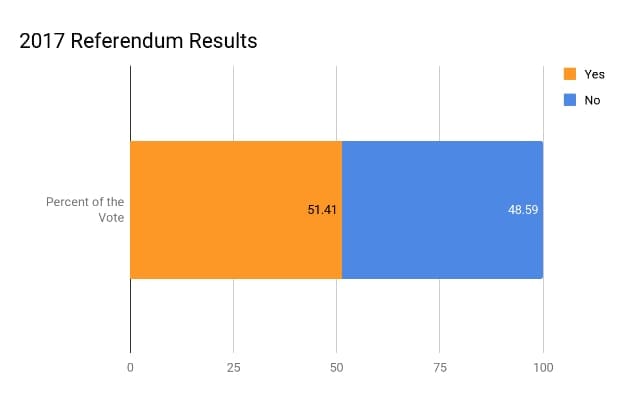
Decision to Hold Early Election
As noted, the announcement by President Erdogan that the 2019 elections would be moved to June 2018 came as something of a shock to a number of Turkey observers. While there had been speculation that Turkey might call for early elections, the Turkish government and AK Party had repeatedly insisted that the 2019 elections would be held as scheduled. However, after Devlet Bahceli, leader of the nationalist MHP and a key ally of the AK Party in the 2017 referendum, called for early elections in early April, the Turkish government reported that it was considered moving the elections forward. Speaking with reporters, Deputy Prime Minister Bekir Bozdag stated, “The AK Party has a tradition of holding elections on time, and we had stated that the vote will take place as scheduled. But authorized party organs should evaluate this and it will be debated.” Following Bahceli’s remarks, he met with President Erdogan on April 18. Shortly after the meeting, the president called for early elections to be held on June 24, 2018, more than a year earlier than the scheduled date for elections. Defending the decision to hold the elections early, President Erdogan highlighted the challenges facing Turkey and warned that under the current system, “though the president and government are working in unison, the diseases of the old system confront us at every step.” On April 20, the Turkish parliament passed a bill scheduling the upcoming elections for June 24, 2018.2018 Election Structure
Whatever the reason for the decision to hold the elections in June 2018, the decision necessitated that Turkey’s Supreme Election Board develop an expedited campaign schedule. As noted, as part of the 2017 constitutional reform, the parliamentary and presidential elections will be held concurrently. However, the presidential election is a two-round vote, and a second round of voting will be held if no candidate wins an absolute majority in the first round. Under the planned schedule, the first round of voting will be held on June 24, 2018. Results for the presidential election will be announced at midnight that day, while parliamentary results will be announced five days later on the 29th. If no candidate captures an absolute majority in the first round of the presidential election, a second round of voting for the presidency will be held on July 8 between the two candidates who captured the largest shares of votes in the first round. The new election laws passed in March allow for political parties to create election ‘alliances,’ a new development in Turkish parliamentary elections. In previous elections, Turkish parties were required to meet a 10% vote threshold in order to win seats in parliament. Under the new laws, the 10% threshold still applies, but it now counts all votes won under an alliance’s banner and the number of deputies in parliament will be determined by the sum of votes won by an alliance. The alliance structure opens to door for smaller parties to win more representation in parliament by partnering with larger parties, thereby capturing enough votes to win seats. The structure of the upcoming elections had also been affected by a number of the constitutional changes affected in 2017. The number of parliamentarians had been raised from 550 to 600, creating 50 news seats and changing the number of members required for a parliamentary government. The age required to run as a parliamentary candidate also lowered from 21 to 18.Main Areas of Voter Interest
According to a poll of 5,500 people between May 13 and May 20 by MAK, a Turkish polling agency, the biggest issue for Turkish voters heading into the election appears to be the economy and the state of the Turkish Lira, with 45% of respondents saying that the economy was their top concern. Under the AK Party since 2002, the Turkish economy has enjoyed what some considered to be a miraculous growth rate. In 2017 alone, it enjoyed a growth rate of 7.4%. The first quarter of 2018 also experienced a growth rate of 7.4%, mirroring that of 2017. However, there are growing concerns about the state of the economy, particularly in foreign financial sectors. A poll by A&G found however that around half of voters think that the government is responsible for the current economic issues. It is unclear however if, or to what extent, concerns over the economy will affect voter turnout and support for the AK Party. In the same poll by MAK, foreign policy was the second highest named issue at 18%. The government is currently riding a high from popular support for its operations abroad in Syria, particularly Operation Olive Branch in the Afrin province of Syria. The operation enjoys broad support from Turkish voters, encompassing not only AK Party supporters, but other constituents as well. In his remarks calling for early elections, President Erdogan raised both the economy and Syria as issues that will be better addressed under the new system that will be formally ushered in by the upcoming elections. President Erdogan asserted that Turkey must “switch to the new executive system in order to take steps for our country’s future in a stronger way” and “remove the election issue from our agenda.”The Presidential Elections
Going into the June 24 elections, while there are ten parties participating in the parliamentary elections, there are only six candidates running for president. These include the incumbent president, Recep Tayyip Erdogan, who is running for the People’s Alliance, which includes his AK Party, the nationalist MHP party, and BBP; Muharrem Ince for the CHP; Meral Aksener for the Iyi Party; Selahattin Demirtas for the HDP; Temel Karamollaoglu for the Felicity Party (SP); and Dogu Perincek for the Vatan Party. HUDA-PAR announced that they are also endorsing Tayyip Erdogan for the presidency.New role for president
As noted above, the June 24 presidential elections will mark the full adoption of the new presidential system, including the removal of the post of Prime Minister. The winner of the election will establish the first government under the new system following either the first or second round of voting. One amendment in the 2017 referendum that took effect immediately, rather than after the next elections, was that the president is no longer barred from being affiliated with a party, allowing President Erdogan to rejoin the AK Party and allowing the candidates in the 2018 election to run more clearly as candidates for the parties they represent. Under the new presidential system, the office of the president enjoys greatly expanded powers than those allowed to it under the 1982 constitution. The president after June 24 will be both the head of state as well as the head of government, rather than the previous system where the president was only the head of state while the prime minister was the head of the government. The president will be able to appoint vice presidents, the number of which is not set in the new laws, as well as other members of their cabinet. The president will also have the power to appoint executives of public institutions and the presidents of public universities. The president, under the 2017 constitutional changes, may also issue decrees that acts as laws on a number of subjects, though when there is a conflict between a presidential decree and a law passed by parliament, the law overrules the decree. One other major change from the 2017 reforms is the expanded role that the president plays in selecting members of the High Council of Judges and Prosecutors (HSYK), which oversees the judicial system in Turkey. Under the new system, the HSYK consists of thirteen members, seven of whom are selected by the parliament while the president selects another four. The minister of justice and the undersecretary are automatic members of the council.Candidate Profiles
Candidates in the 2018 election were able to be put on the ballot through a number of methods. Parties that won at least 5% of the vote in the last election (November 2015) were automatically eligible to nominate a candidate, and parties could form alliances and field a candidate if their combined vote share was more than 5%. Independent candidates could also be placed on the ballot by collecting 100,000 signatures from voters. The only parties who met the 5% threshold from the last election were the AK Party, the CHP, and the HDP, while the newly formed IYI Party, the Felicity Party (SP), and Vatan Party (VP) nominated candidates by collecting signatures from voters. The AK Party and MHP formed a parliamentary alliance ahead of the elections and announced that they would field a joint candidate in President Recep Tayyip Erdogan. While four opposition parties, including the CHP, the IYI Party, the SP, and the Democrat Party, announced that they would form a parliamentary alliance, they have not fielded a joint presidential candidate. There had been some speculation that Abdullah Gul, once a close Erdogan ally, might run as a unitary opposition candidate, but he announced that he would not run in late April after the failure of the opposition parties to agree on the joint candidate. [caption id="attachment_4615" align="aligncenter" width="607"] Presidential Candidates (2018)[/caption]
As may be recalled in presidential elections in 2014, CHP and MHP, two main opposition parties at the time agreed to nominate Ekmeleddin Ihsanoglu, former general secretary of the Organization of Islamic Conference for the presidency. After the failure of the Abdullah Gul formula the opposition parties decided to support their own candidates in the presidential elections. Instead of Kemal Kılıçdaroğlu, who is the current chairman of the CHP Muharrem Ince will run as the CHP candidate, Selahattin Demirtas will run as the HDP candidate, Meral Aksener will run as the IYI Party candidate, Temel Karamollaoglu will run as the SP candidate, and Dogu Perincek will run as the Vatan party candidate. If none of these six candidates win an outright majority on June 24, the two leading candidates will compete in a runoff vote. Current polls suggest that Erdogan definitely will be the front runner in the first round. None of the public opinion polls so far dispute this claim. Ince will likely finish second behind Erdogan.
Presidential Candidates (2018)[/caption]
As may be recalled in presidential elections in 2014, CHP and MHP, two main opposition parties at the time agreed to nominate Ekmeleddin Ihsanoglu, former general secretary of the Organization of Islamic Conference for the presidency. After the failure of the Abdullah Gul formula the opposition parties decided to support their own candidates in the presidential elections. Instead of Kemal Kılıçdaroğlu, who is the current chairman of the CHP Muharrem Ince will run as the CHP candidate, Selahattin Demirtas will run as the HDP candidate, Meral Aksener will run as the IYI Party candidate, Temel Karamollaoglu will run as the SP candidate, and Dogu Perincek will run as the Vatan party candidate. If none of these six candidates win an outright majority on June 24, the two leading candidates will compete in a runoff vote. Current polls suggest that Erdogan definitely will be the front runner in the first round. None of the public opinion polls so far dispute this claim. Ince will likely finish second behind Erdogan.
Recep Tayyip Erdogan
In an widely expected move, the AK Party nominated current president and AK Party chairman Recep Tayyip Erdogan as their presidential candidate on May 3. In addition to representing the AK Party, President Erdogan is running as the candidate for the People’s Alliance, an electoral alliance between the AK Party and the nationalist MHP, in addition to the Great Unity Party (BBP). MHP leader Devlet Bahceli had earlier announced that the MHP would not put forward a presidential candidate, but would instead back President Erdogan. President Erdogan, as one of the key backers for the 2017 constitutional referendum to establish the new presidential system in Turkey, has unsurprisingly promised to defend and assert the new governmental system if he is elected. At a rally in late May, President Erdogan laid out the AK Party’s platform. The three main points of the election platform are more democracy, more freedoms and more wealth. In both its election manifesto and electoral platform AK Party enumerated its achievements in the last sixteen years in economy, governance, social services, and foreign policy and national security. Following this, the election promises were enumerated. One of the key issues President Erdogan addressed is the Turkish economy. He highlighted the economic progress that has been in Turkey over the past fifteen years of AK Party governance, asserting, “we moved our country from low-wage level to mid-wage level, and now our aim is to move to higher levels on that scale.” He promised to further lower the interest rates, inflation, and trade deficit. In addition to his promises in fiscal discipline, Erdogan also promised to invest in technology and industry, that includes a strong national defense industry and presenting brands to the world. To fight against poverty was once again in the program together with high profile projects, such as Channel Istanbul, Canakkale Bridge and the Third Airport of Istanbul. According to polls, the economy is one of the top concerns for Turkish voters going into the 2018 elections, followed by foreign policy issues. As noted, President Erdogan couched his call for early elections in the argument that the new presidential system will allow the government to better address the economic woes facing Turks. Regarding foreign policy, President Erdogan declared that one of his goals would be to mend ties with the EU, which have taken a downturn, particularly following the 2016 attempted coup. “We will strengthen our economic and political ties with various regional structures, especially the EU” he declared. The president further argued that Turkey has “never given up on our goal of full membership to the EU” and will continue to pursue accession. Repeated again in this part of the election manifesto he mentioned the significance of the national defense industry. More broadly, in announcing the AK Party’s election manifesto, President Erdogan trumped the “new alliances” that Turkey has made and highlighted that its “geostrategic location enables it to forge alliances with different actors” and asserted that the country will maintain an independent foreign policy. President Erdogan also promised to continue cross-border operations in Syria akin to Operation Euphrates Shield and Operation Olive Branch. The two operations have enjoyed widespread support within Turkey as they aim to provide stability along the Syrian border which previously was an area of repeated clashes. In addition to continued military operations, the president pledged to continue to grow the Turkish domestic defense industry, which has enjoyed a surge in development and exports over the past few years. Overall in his election manifesto and later in his TV interviews, Erdogan underlined that he is expecting this new era after the election to be an era of rapid rise of Turkey. In addition to the current projects, he enumerated different projects for increasing industrial output of Turkey, and vocalized his goal to make Turkey one of the ten largest economies in the world.Muharrem Ince
Muharrem Ince, who has been an MP since 2002, was nominated by the largest opposition party, the CHP. Following the initial announcement that the elections would be held on June 24, it was somewhat unclear who the CHP would nominate, as the party had suggested that it would not nominate its leader, Kemal Kilicdaroglu, because “it believes an elected president should not be the leader of a political party.” Eventually, the party announced that it would back Ince, a long-serving MP and previously a challenger to Kilicdaroglu for party leadership, for president. According to the polls Ince demonstrated dynamism and energized the CHP voters that originally intended to vote for Meral Aksener in the elections. Thus, although in the polls CHP and Ince votes tend to rise, it does not directly affect the AK Party votes. Since the beginning of the presidential campaigns the votes have been swinging between the two opposition candidates. Neither of them would be able to gain the votes of the AK Party voters. Although the two candidates have been careful not to launch campaign attacks against one another, Ince’s surge has been a major irritant for the Aksener campaign. Like a number of other opposition candidates, Ince has criticized the new presidential system that will be instituted following the 2018 elections. CHP leader Kemal Kilicdaroglu said that if the National Alliance, which includes the CHP, the IYI Party, the SP, and the Democrat Party, wins the 2018 parliamentary elections, they will write a “civilian constitution” that would strengthen the parliamentary system. He has also stated that he will end the state of emergency, a common refrain from opposition candidates. On domestic issues, Ince has courted the Kurdish vote by visiting Demirtas in prison and calling for the HDP candidate’s release for the election. He has also promise to attempt to establish a reconciliation effort to negotiate an end to the insurgency in the southeast as well as allowing for education in the Kurdish language. At a rally on May 10, Ince argued that the Kurdish problem is “a political, economic and cultural problem” that can be resolved through “peace, growth and sharing.” On the economy, Ince has criticized the AK Party government’s economic policies and offered populist promises, such as cutting the price of diesel for farmers, raising the minimum wage, providing scholarships for ten thousand students to be educated abroad, to provide free healthcare to everyone under 18 free and every family will own a house. He did not provide a detailed plan in regards to his approach to the economy in Turkey. Instead he constantly mentioned that as a physics professor he is familiar with mathematics and can grasp the economy in Turkey. He responded to questions in regards to the source for his populist policy promises by stating that he will cut the expenditures of the state. He also promised to increased GDP per capita to fifteen thousand dollars. In an interview in late May, Ince claimed that he had prepared an “emergency reform package” for the Turkish economy, but warned that the economy can only be fixed through efforts in “political and legal areas.” On foreign policy issues, like most other candidates, Ince has proposed that in his administration, Turkey-EU ties could be mended, asserting that Turkey’s European trend hails as far back as the Tanzimat reforms. He similarly suggested on May 28 that Turkey and the US could rebuild ties and cooperate on issues, asserting that, “we can make peace and reconcile.” Earlier in May however, Ince had declared that the US must extradite Fethullah Gulen, or risk the US air base at Incirlik being shut down. On Syria, Ince has criticized the government for allowing Syrian refugees to travel to Syria for work and then return to Turkey, and told a rally on May 18 that he would appoint an ambassador to Syria if elected. Ince has constantly emphasized his opposition to the presence of the Syrian refugees in Turkey. Ince declared that Turkey should work to create a “basin of friendship” in the Middle East and that he would pursue policies to mend ties with regional countries if elected.Selahattin Demirtas
The presidential candidate for the People’s Democratic Party (HDP), often described as a pro-Kurdish opposition party, is Selahattin Demirtas, a former co-chair of the party who has been in jail since 2016 while he awaits trial on terrorism charges. He was a presidential candidate in 2014 for HDP as well. In simultaneous announcements in Istanbul and Diyarbakir on May 4, the HDP party leaders announced that Demirtas would be the presidential candidate. He had previously run as the HDP’s candidate in the 2014 elections and won 9.8% of the vote, coming in third place. As noted, thanks to the HDP’s vote share in the 2015 elections, Demirtas did not have to collect signatures but was instead nominated by his party for the 2018 elections. After his appeal for release was rejected on May 21, Demirtas’ campaign has been limited due to his being in prison, though both Muharrem Ince from the CHP and Meral Aksener from the IYI Party have called for his release. On June 6, Demirtas addressed voters and supporters in a speech during a phone call with his wife and has given a few statements on his main points of focus through his lawyer. Demirtas has focused his campaign on “unemployment, poverty, justice, security, health and education,” which he told Rudaw are the main issues facing Turkey in an interview through his lawyer. Demirtas has called for a number of populist programs for various segments of the population, including “youth cards” to help young Turks as well as a 1,000 lira monthly payment to Turkish pensioners. In response to questions submitted to him by the Associated Press, Demirtas claimed that if elected, he aims to “enact a new constitution for Turkey, underscoring personal freedoms, the independence of the courts and a return to parliamentary democracy,” as well as seek a resolution to the continuing insurgency in southeastern Turkey.Meral Aksener
Meral Aksener, a former interior minister and MHP party member, now leader of the newly formed IYI Party, was one of the first opposition candidates to announce that she would run for the presidency. For the last year she was considered as a potential challenger of Erdogan in the presidential election. In multiple different profiles in western media Aksener was presented as the politician that could defeat Erdogan. However soon after the declaration of the election schedule she started to get under scrutiny by the voters and started to lose her appeal. According to the polls she lost significant portion of her votes to Muharrem Ince. Her dull public appearance compared to Ince was considered her biggest problem. She failed to gain the voters’ confidence, especially in TV interviews. As a splinter party candidate she continued to appeal mostly to the MHP voters. While there were questions that the IYI Party had been established long enough to field a candidate, the Turkish election board did eventually approve her candidacy. Aksener was required to collect 100,000 signatures as the IYI Party did not have 5% of the vote or a parliamentary group, which she did within deadline.Both Aksener and Ince have pledged that they will support the other depending on who proceeds to the second round of voting, assuming one of the two does so and the second round occurs. The IYI Party, a small nationalist party, was founded only in October 2017 by Aksener after she was expelled from the MHP following an attempt to unseat party leader Devlet Bahceli. Since leaving the MHP and founding the IYI Party, Aksener has been a strident critic of President Erdogan and the AK Party government. There are some who expect that the IYI Party may be able to win supporters from not only the MHP, where Aksener hails from, but from the AK Party and the CHP as well. However, others expect that her strong nationalist background will limit her appeal to Kurdish voters who are expected to be a key factor in the June 24 elections. In the public opinion polls Aksener is scoring far behind Erdogan and Ince. Aksener has called for Demirtas, the HDP candidate, to be released from prison and has sought to conduct outreach to the Kurdish population in southeastern Turkey, but HDP officials have said their supporters would not vote for Aksener and she has not put forth policies to address the question of how to resolve tensions in the southeast. As part of the campaign ahead of the June elections, Aksener has called on the opposition parties in the National Alliance to develop a “roadmap” to return Turkey to a parliamentary system, rather than the presidential system adopted following the 2017 referendum. She has also pledged to end the state of emergency currently in place in Turkey and to end the block on Wikipedia in the country. In addition to her opposition to the new presidential system, Aksener has also spoken repeatedly about the state of the Turkish economy during her campaign. In May, she criticized the AK Party’s economic governance, likening the Turkish economy to a “bus on the edge of a cliff” and warning that the AK Party is a “tired driver.” She additionally claimed that through a project called the ‘Turkey Solidarity Fund,’ Turkey would “purchase the debts from consumer loans, credit card and overdraft accounts of 4.5 million citizens whose debts are under legal supervision of banks or consumer financing companies and whose debts have been sold to collection companies as of April 30, 2018” and either erase those debts or restructure them to be paid off over 10 years. The election manifesto also has populist promises to the youth and farmers in Turkey. Speaking to foreign policy issues, Aksener has vowed to conduct foreign policy in a more transparent manner and to take actions such as reviving the long-stalled EU accession process and to mend ties with the European bloc. On the question of Syria, in 2017 she called for the development of a “humanitarian framework” to help Syrian refugees in Turkey return to their country. During the campaign, Aksener argued that if elected, she and the IYI Party aim to restore “security and the system [in Syria], to open a path so [refugees] can happily live in their homeland.” Similar to Muharrem Ince, the return of the refugees to their home constitutes one of the most critical electoral promises of Aksener. Aksener also made promises about education such as, shutting down the Council for Higher Education and opening military high schools.Temel Karamollaoglu
Temel Karamollaoglu, the leader of the small Islamist Felicity Party (SP), is also running for the presidency after collecting 100,000 signatures to run as an independent candidate. While the SP was founded in 2001 and shares its roots in the banned ‘Virtue Party’ with the AK Party, the SP has never won enough votes in an election to hold seats in parliament. Despite its lack of widespread support, there are some who believe it could act as a potential ‘kingmaker’ in the 2018 elections with its small vote share, though others argue it will likely only have an affect in the parliamentary elections and not the presidential vote. In an interview with Reuters after announcing his candidacy, Karamollaoglu argued that he hoped to capitalize on disaffected AK Party voters who feel are unhappy with the government’s actions. He has couched much of his campaign rhetoric in addressing what he argues is growing authoritarianism and a lack of justice in the post-2016 coup environment. In stark contrast to the campaigns of other opposition candidates and even President Erdogan, the SP is opposed to Turkey’s membership in the EU as it believes “western countries cannot get rid of their old imperialist and colonialist habits” and that Turkey would lose its identity and independence in the bloc.Dogu Perincek
Dogu Perincek, the chairman of the Vatan Party (Patriotic Party, VP), is also running for the presidency. A fringe party, the VP received .52% of the vote in the last parliamentary elections in November 2015. In its mission statement, the Vatan Party asserts that under its rule, “Turkey will be governed from Turkey. Foreign control and intervention over Turkey will be eliminated with all its foundations.” Perincek and the Vatan Party have repeatedly expressed their skepticism towards alliances with the US and the EU and have suggested instead that Turkey adopt a more Eurasia-oriented foreign policy and end its accession process to the EU.Past elections
The presidential election on June 24 will be only the second direct presidential election in Turkey where voters will choose their president, rather than indirect elections held by parliament. The first direct presidential election was held in 2014, the result of the 2007 constitutional reforms that were sparked by the crisis of 2007 when the AK Party’s presidential nominee was blocked and early elections were eventually called.2014 Elections
On August 10, 2014, Turkey held the 2014 presidential elections, the first direct presidential election following the 2007 constitutional reforms. Three candidates ran for the office, including then-Prime Minister Recep Tayyip Erdogan from the AK Party, Selahattin Demirtas from the predominantly Kurdish HDP, and Ekmelettin Ihsanoglu as a joint opposition candidate backed by both the CHP and MHP. According to the final vote counts, President Erdogan won with 51.8% of the vote in the first round of voting, compared to Ihsanoglu’s 38.4% and Demirtas’ 9.8%. According to reports, around 73% of eligible Turkish voters participated in the election. Like the 2018 elections in June, the 2014 elections were scheduled as a two-round voting system, with the first round to be held on August 10 and the second, if no candidate won a clear majority, to be held on August 24. Speaking on August 10, the head of the election commission, Sadi Guven, said that given the unofficial results, no ballots would be printed for a runoff. Erdogan’s win in the 2014 election was seen by some observers as a step towards empowering the office of the presidency, which as noted, was a long-running goal evinced by the AK Party and Erdogan. His win also required that, under the 1982 constitution, he formally end his affiliation with the AK Party.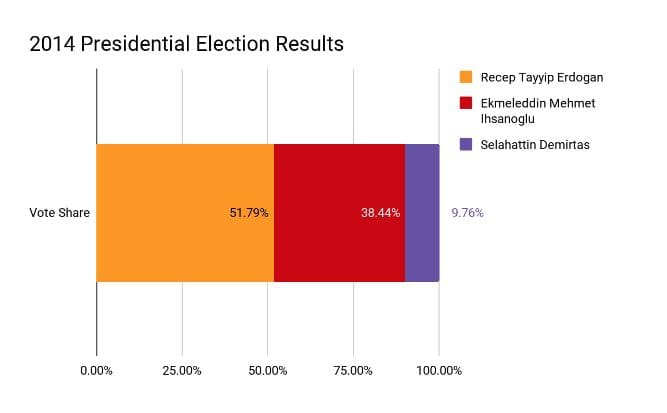
Parliamentary Elections
The snap elections that will be held June 24, 2018 will include both a Presidential and Parliamentary election at the same time. Based on the new structure and laws created from the 2017 referendum, the parliamentary elections will see ten political parties represented in the parliamentary elections, as well as independent candidates running for seats. The new Alliance Law provides grounds for parties to align for elections. Two alliances were announced encompassing seven parties, while the remaining parties are running individually. The People’s Alliance includes the Justice and Development Party (AK Party) and the Nationalist Movement Party (MHP); the Great Unity Party (BBP) has 18 members of its party who are on the list of candidates for the AK Party. The Nation Alliance includes the Republic People’s Party (CHP), the Good Party (IYI Party), and the Felicity Party (SP). The Democratic Party (DP) is represented under the IYI Party umbrella, with four candidates represented on the IYI Party candidate list. Also, five additional SP candidates are running on the CHP list. The parties running with no alliances include the Peoples’ Democratic Party (HDP), the Free Cause Party (Huda Par), and the Patriotic Party (Vatan Party). Thus on the ballot there will be two alliances and three political parties. [caption id="attachment_4613" align="aligncenter" width="675"]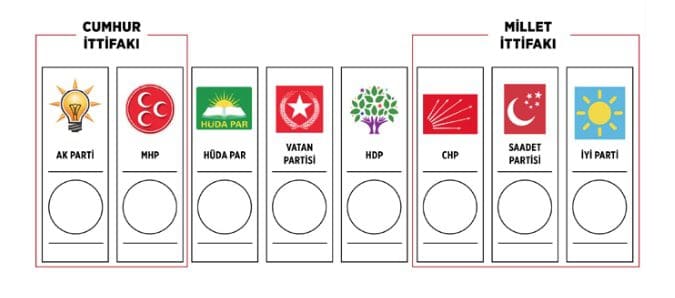 Parliamentary Elections Ballot[/caption]
The candidates for the parliamentary elections range in employment status. A large number of the candidates currently are employed as lawyers, 451 individuals across the eight parties. The other large portions of employment include 640 self-employed individuals, 350 engineers, 135 doctors, 289 students, and 170 teachers. Furthermore 904 candidates out of the 4,200 listed are women, representing 21.5% of the candidates. The youngest candidate is 18 years old, representing the AK Party. The supreme board of elections provided the education levels of all the candidates. There are 3,085 candidates who have received a bachelor’s degree or higher running for seats; 1,490 have received a high school education; and 348 have received below high school level education. There are 388 candidates who are between 18 and 29 years old, 723 candidates ages 30-39, 1,094 candidates between 40-49 years old, 968 candidates 50-59 years of age, 398 candidates between the ages of 60 and 69, and 29 candidates over the age of 70 for the six parties that will be further analyzed in this paper.
Parliamentary Elections Ballot[/caption]
The candidates for the parliamentary elections range in employment status. A large number of the candidates currently are employed as lawyers, 451 individuals across the eight parties. The other large portions of employment include 640 self-employed individuals, 350 engineers, 135 doctors, 289 students, and 170 teachers. Furthermore 904 candidates out of the 4,200 listed are women, representing 21.5% of the candidates. The youngest candidate is 18 years old, representing the AK Party. The supreme board of elections provided the education levels of all the candidates. There are 3,085 candidates who have received a bachelor’s degree or higher running for seats; 1,490 have received a high school education; and 348 have received below high school level education. There are 388 candidates who are between 18 and 29 years old, 723 candidates ages 30-39, 1,094 candidates between 40-49 years old, 968 candidates 50-59 years of age, 398 candidates between the ages of 60 and 69, and 29 candidates over the age of 70 for the six parties that will be further analyzed in this paper.
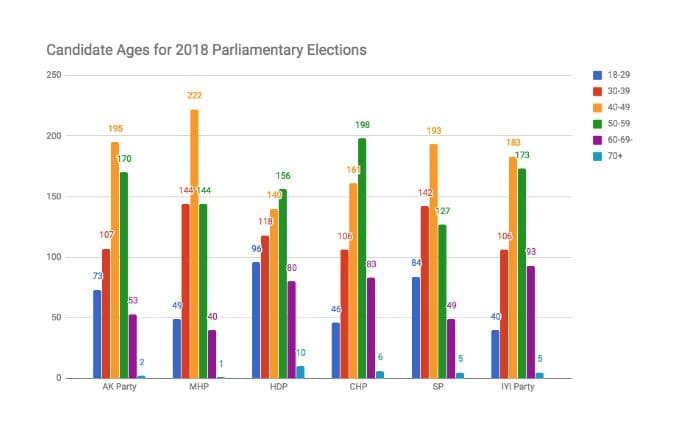
Changes to the Parliamentary System
In April 2017, Turkey voted yes to a referendum that would pave the course for a government structure change. As a result of the referendum election, the parliament structure and powers will be changing with the upcoming elections, as outlined in the 18 amendments to the constitution. The changes to the parliament structure will go into effect after the June 24 elections this year. The parliament will be increasing the size of the members from the current number of 550 seats to 600 members. The requirements to become a candidate have also changed. The age limit held that candidates must be older than 25 years of age. However, with the new system candidates must be over the age of 18 years old. Regarding the term length for parliamentary candidates, the terms will be expanded from four years to five years, unless early elections are called. Under the new system cabinet members cannot be members of parliament. If a member of parliament is selected as a cabinet member they must resign. Powers have also changed for the parliament. Most powers remain the same with the new constitution enumerating parliament’s powers as follows: “to enact, amend and repeal laws; to debate and adopt the bills of the budget and final accounts; to decide to issue currency and declare war; to approve the ratification of international treaties, to decide with the majority of three-fifths of the Grand National Assembly of Turkey to proclaim amnesty and pardon; and to exercise the powers and carry out the duties envisaged in the other articles of the Constitution.” Parliament will no longer be able to issue statutory decrees and the Council of Ministers will be disbanded under the new system, which removes Parliament’s authority to monitor the cabinet. However, Parliament will still have the ability to overturn presidential decrees. Parliament can now hold proceedings to investigate the president on criminal conduct allegations with a majority vote. If the process results in an impeachment hearing, Parliament no longer will decide whether or not the president should be removed from office, the Constitutional Court will decide. Parliament also has the ability to call for early elections under the new constitution. The Parliament would have to vote with three-fifths majority to hold new elections and if called early, both the parliament and the president would have the elections. Parliament will now have the ability to select seven judges under the new constitution, a power it previously did not have. The Prime Ministry position will also be ending with the upcoming elections. Lastly, Parliament will have the final say in the budget that the president will submit.Major Political Parties
There will be 600 members of parliament elected. Table 1 shows the number of seats that will represent each province. The following six parties discussed have submitted 600 candidates each, filling all candidacy spots for the 2018 elections.The People’s Alliance
AK Party The AK Party led by Recep Tayyip Erdogan is the current party in power in Turkey. Recep Tayyip Erdogan is also the presidential candidate for the party. AK Party’s released manifesto described the goals and positions the party will be supporting on current topics in Turkey. Other than the issues that were emphasized in the presidential election section, the manifesto addressed concerns ranging from the economy to the July 15th coup attempt. Furthermore, the party divided its election declaration into seven chapters: new executive system; strong democracy; people and society; a stable and strong economy; strategic sectors and innovative production; environment, urban management, and municipalities; and, foreign policy and national security. [caption id="attachment_4614" align="aligncenter" width="489"]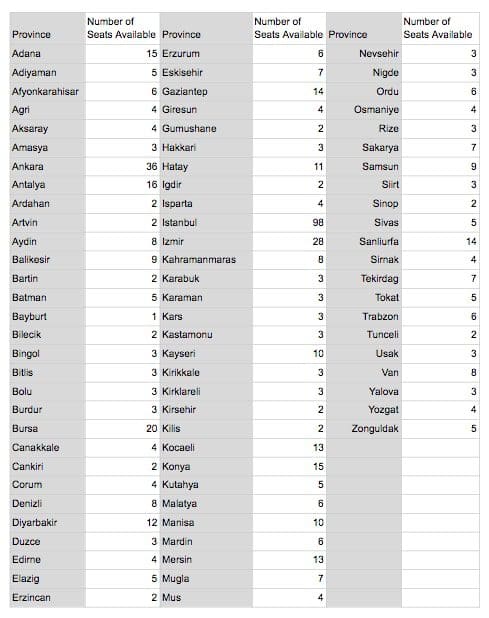 Table 1: Parliamentary Seats by Province[/caption]
The new elections will end with a new government structure for Turkey. Aware of the upcoming changes, the AK Party addressed the concerns by discussing its objectives to strengthen the justice system. The new government system has been applauded by the party, as it argues the new system will help bring about a full democratic Turkey. The party expanded off its intent to strengthen democracy highlighting its goals for combating the security threats to Turkey. The party highlighted the July 15th coup attempt and presence of PYD/YPG forces as major security threats it would tackle in order to protects its citizens. Securing the nation and its borders from terrorists is platform the AK Party prioritized in its manifesto. The manifesto also claimed that the state of emergency that was instilled after the July 15th coup attempt with remain in place. The party argued that the state of emergency will remain in place until all threats from terrorists groups are eliminated.
Security paved way for the party’s stance on Syria. AK Party will continue its efforts to establish a ‘new and legitimate’ leadership in Syria, in which it plans to re-establish a positive working relationship with the country. Furthering its foreign policy agenda, the AK Party hopes to overcome problems with the US, noting the importance of maintaining a close relationship between the two countries. However, the AK Party provided three demands that it will base its cooperation on: the US should cut ties with the YPG, provide support to Turkey in its struggle against the outlawed and recognized terrorist group PKK, and extradite Fethullah Gulen, the suspected plotter of the July 15th military coup, back to Turkey. The manifesto also outlined the goal to continue improving relations with Russia and the objective to continue its bid to become a member of the European Union.
As part of the seven chapters, AK Party will aim to provide Turkish citizens with greener environments country-wide. Erdogan announced the goal of converting the Istanbul airport over to a park, larger than Central Park in New York City, once the airport moves to the new location upon completion. The party also looks to support local administrations in order to promote cinema, visual arts, and establish cultural centers in each city to create more inclusive and innovative libraries. The manifesto also commented on education, with the hopes to increase education quality. The party is considering extensive reforms for the upcoming term that would include updating outdated syllabi and launching a new exchange program. The manifesto outlined the aims and objectives of the AK Party, providing details for its citizens to understand its plan for the new term of governance.
AK Party nominated 600 candidates for the parliamentary elections, maximizing its bid for the 600 positions available. The AK Party has nominated 126 women of the 600 person candidate list. The party has 73 candidates who are aged 18-29, 107 candidates aged 30-39, 195 candidates aged 40-49, 170 candidates between 50-59 years old, 53 candidates between the ages of 60-69 and 2 candidates over 70 years old. The candidates have a wide range of employment experience: candidates represented have worked in the private sector, as lawyers, architects, engineers, doctors, government executives, tax professionals, pharmacists, journalists, and governors, while some are athletes and students. Of the 600 candidates, 536 have an educational level of a bachelor’s degree or higher, 61 have a high school education only, and 3 have below high school education. In all of the public opinion polls in Turkey, AK Party is favored as the party that is likely to win the elections by a rather wide margin. For the last sixteen years the party has never been defeated in the local and general elections or in referendums. However, due to the alliance system and possibility of the parties with smaller votes to enter the parliament some analysts are concerned if the AK party, as a single party, can win the majority of the seats in the parliament, meaning more than 300.
MHP
MHP has presented its own manifesto and candidate list, campaigning on a slogan, “National Revival, Blessed Uprising.” MHP is Turkish nationalist party led by Devlet Bahceli. In lieu of presenting a presidential candidate from their own party, MHP is support Recep Tayyip Erdogan. MHP’s manifesto emphasized five outlines areas to focus on in the term: smart state and public administration; justice; combating corruption; multifaceted and multidimensional foreign policy; and, industrialization and small and medium-sized enterprises (SMEs).
The party also focused on its long-term strategic goal for Turkey. It aims to bring Turkey into a position of global power and a leading country in the world by 2053. Similar to the other parties, MHP addresses the economy and education in its manifesto. MHP promised to eliminate entrance exams for university, as well as, introduce interest-free loans for education. The party also stated it would provide free healthcare for youth until they have employment. Foreign policy differed from that of MHP’s aligned party, AK Party. The MHP opposed accession into the European Union, and its view on relations with the US is neutral.
With regards to the economy, MHP promised reforms that would assist farmers to retired individuals to families of disabled and veterans. The party stated it would end VAT for farmers, lower the taxes for seeds and agricultural pesticides. It would also provide economic relief to traders through policies such as tax-free fuel. MHP promised early retirement for veterans and employment for the children of martyred people and an increase in the salaries for their parents. The party also outlined a “family support aid” fixed as half of the minimum wage for one unemployed person in each family. The manifesto also stated the party would remove taxes on minimum wage or part of salaries equaline to the minimum wage. Craftsmen and artisans were also targeted by the party’s economic pledges.
The candidates representing MHP come from a range of educational backgrounds. Nineteen have a education level of primary school, 33 have an education level of middle school, while 138 have an education level of high school. Meanwhile, 290 have a bachelor’s degree, 50 hold a master’s degree, and 31 have a doctoral degree. MHP submitted 600 candidates, running for all 600 seats in the parliament. Seventy-six of the candidates representing the MHP are women. Thirteen of the current 35 MHP members of parliament do not appear on the candidate list for re-election. The party has 49 candidates aged between 18-29, 144 candidates who are between 30-39 years old, 222 candidates between the ages of 40-49, 144 candidates 50-59 years old, 40 candidates aged 60-69, and 1 candidate over 70 years old.
Following the split of the IYI Party, the MHP has been scoring poorly in the polls. However, over the last few weeks there has been a significant improvement in its scores. Although, to date the alliance has been strong with the AK Party, there have been low intensity tensions between the two parties in regards to several minor issue areas, such as the issue of Bahceli’s insistence for general amnesty for the prisoners. Bahceli also complained in the campaign that AK Party candidates are trying to gain votes from the MHP. Erdogan later made statements in regards to these issues, denying any preparation for a general amnesty but finding that Bahceli is right to complain about the attitude of the some of the AK Party candidates.
Table 1: Parliamentary Seats by Province[/caption]
The new elections will end with a new government structure for Turkey. Aware of the upcoming changes, the AK Party addressed the concerns by discussing its objectives to strengthen the justice system. The new government system has been applauded by the party, as it argues the new system will help bring about a full democratic Turkey. The party expanded off its intent to strengthen democracy highlighting its goals for combating the security threats to Turkey. The party highlighted the July 15th coup attempt and presence of PYD/YPG forces as major security threats it would tackle in order to protects its citizens. Securing the nation and its borders from terrorists is platform the AK Party prioritized in its manifesto. The manifesto also claimed that the state of emergency that was instilled after the July 15th coup attempt with remain in place. The party argued that the state of emergency will remain in place until all threats from terrorists groups are eliminated.
Security paved way for the party’s stance on Syria. AK Party will continue its efforts to establish a ‘new and legitimate’ leadership in Syria, in which it plans to re-establish a positive working relationship with the country. Furthering its foreign policy agenda, the AK Party hopes to overcome problems with the US, noting the importance of maintaining a close relationship between the two countries. However, the AK Party provided three demands that it will base its cooperation on: the US should cut ties with the YPG, provide support to Turkey in its struggle against the outlawed and recognized terrorist group PKK, and extradite Fethullah Gulen, the suspected plotter of the July 15th military coup, back to Turkey. The manifesto also outlined the goal to continue improving relations with Russia and the objective to continue its bid to become a member of the European Union.
As part of the seven chapters, AK Party will aim to provide Turkish citizens with greener environments country-wide. Erdogan announced the goal of converting the Istanbul airport over to a park, larger than Central Park in New York City, once the airport moves to the new location upon completion. The party also looks to support local administrations in order to promote cinema, visual arts, and establish cultural centers in each city to create more inclusive and innovative libraries. The manifesto also commented on education, with the hopes to increase education quality. The party is considering extensive reforms for the upcoming term that would include updating outdated syllabi and launching a new exchange program. The manifesto outlined the aims and objectives of the AK Party, providing details for its citizens to understand its plan for the new term of governance.
AK Party nominated 600 candidates for the parliamentary elections, maximizing its bid for the 600 positions available. The AK Party has nominated 126 women of the 600 person candidate list. The party has 73 candidates who are aged 18-29, 107 candidates aged 30-39, 195 candidates aged 40-49, 170 candidates between 50-59 years old, 53 candidates between the ages of 60-69 and 2 candidates over 70 years old. The candidates have a wide range of employment experience: candidates represented have worked in the private sector, as lawyers, architects, engineers, doctors, government executives, tax professionals, pharmacists, journalists, and governors, while some are athletes and students. Of the 600 candidates, 536 have an educational level of a bachelor’s degree or higher, 61 have a high school education only, and 3 have below high school education. In all of the public opinion polls in Turkey, AK Party is favored as the party that is likely to win the elections by a rather wide margin. For the last sixteen years the party has never been defeated in the local and general elections or in referendums. However, due to the alliance system and possibility of the parties with smaller votes to enter the parliament some analysts are concerned if the AK party, as a single party, can win the majority of the seats in the parliament, meaning more than 300.
MHP
MHP has presented its own manifesto and candidate list, campaigning on a slogan, “National Revival, Blessed Uprising.” MHP is Turkish nationalist party led by Devlet Bahceli. In lieu of presenting a presidential candidate from their own party, MHP is support Recep Tayyip Erdogan. MHP’s manifesto emphasized five outlines areas to focus on in the term: smart state and public administration; justice; combating corruption; multifaceted and multidimensional foreign policy; and, industrialization and small and medium-sized enterprises (SMEs).
The party also focused on its long-term strategic goal for Turkey. It aims to bring Turkey into a position of global power and a leading country in the world by 2053. Similar to the other parties, MHP addresses the economy and education in its manifesto. MHP promised to eliminate entrance exams for university, as well as, introduce interest-free loans for education. The party also stated it would provide free healthcare for youth until they have employment. Foreign policy differed from that of MHP’s aligned party, AK Party. The MHP opposed accession into the European Union, and its view on relations with the US is neutral.
With regards to the economy, MHP promised reforms that would assist farmers to retired individuals to families of disabled and veterans. The party stated it would end VAT for farmers, lower the taxes for seeds and agricultural pesticides. It would also provide economic relief to traders through policies such as tax-free fuel. MHP promised early retirement for veterans and employment for the children of martyred people and an increase in the salaries for their parents. The party also outlined a “family support aid” fixed as half of the minimum wage for one unemployed person in each family. The manifesto also stated the party would remove taxes on minimum wage or part of salaries equaline to the minimum wage. Craftsmen and artisans were also targeted by the party’s economic pledges.
The candidates representing MHP come from a range of educational backgrounds. Nineteen have a education level of primary school, 33 have an education level of middle school, while 138 have an education level of high school. Meanwhile, 290 have a bachelor’s degree, 50 hold a master’s degree, and 31 have a doctoral degree. MHP submitted 600 candidates, running for all 600 seats in the parliament. Seventy-six of the candidates representing the MHP are women. Thirteen of the current 35 MHP members of parliament do not appear on the candidate list for re-election. The party has 49 candidates aged between 18-29, 144 candidates who are between 30-39 years old, 222 candidates between the ages of 40-49, 144 candidates 50-59 years old, 40 candidates aged 60-69, and 1 candidate over 70 years old.
Following the split of the IYI Party, the MHP has been scoring poorly in the polls. However, over the last few weeks there has been a significant improvement in its scores. Although, to date the alliance has been strong with the AK Party, there have been low intensity tensions between the two parties in regards to several minor issue areas, such as the issue of Bahceli’s insistence for general amnesty for the prisoners. Bahceli also complained in the campaign that AK Party candidates are trying to gain votes from the MHP. Erdogan later made statements in regards to these issues, denying any preparation for a general amnesty but finding that Bahceli is right to complain about the attitude of the some of the AK Party candidates.
The Nation’s Alliance
CHP CHP is a leading party an the largest party in the opposition alliance, the Nation Alliance. A social democratic party, the leader is Kemal Kilicdaroglu. The official campaign slogan for the party is “We’re coming for the nation.” Muharrem Ince is the Presidential candidate from the CHP and has been outspoken about criticizing many of Erdogan’s policies. The party transferred 15 deputies to the IYI party in order to help ensure the party would be allowed to run in the election. However, since the election board granted the IYI Party to participate, those 15 deputies have returned to the CHP and are candidates on the CHP parliament candidate list. The manifesto presented the party’s goals to find solutions to what it considers are the five main problems in Turkey. The five main problems include justice, education, economy, social peace, and foreign policy. CHP described the economy as one of the most problematic sectors in Turkey. In order to address the economic problems, the party outlined various ways it will fix the economy, lower unemployment and transform Turkey into a high-tech hub. CHP stated it would increase the net minimum wage to 2,000 Turkish liras ($467) without taxes and that the lowest pension would be 1,500 Turkish liras ($318). Moreover, the party also promised to provide tax cuts to farmers and credits with zero interest to SMEs. Foreign policy was highlighted in the manifesto as well. It has been made apparent the goals of CHP to send Syrian refugees back, as Kilicdaroglu claimed there is no longer a long-lasting conflict environment in Syria anymore, therefore Syrians should return. However, the CHP party has also signaled warming relations with Assad in Syria. CHP outlined a plan to establish an “Organization of Middle East Peace and Cooperation,” responsible for solving regional problems. The party claimed Turkey, Iran, Iraq, and Syria would be the founders, which would allow the states to work together and live in peace. The party also aims to repair relations with the European Union in the new term. The CHP promised to lift the state of emergency as part of its solutions for the justice problems. The party also claimed it would establish an independent, impartial, and fair justice system. Addressing the education problem, the party stated that it will end exam fees. Furthermore, it will also increase the wages for teachers in the Turkish education system. Ince also announced that the CHP will take bold steps to solve the Kurdish problem within Turkey. CHP has also presented 600 parliament candidates, running for all 600 seats. Of the 600 candidates, 136 of the candidates are women for CHP. Furthermore, of the candidates who are in parliament now, 58 are not represented on the 600 candidate list for re-election. Of the 600 candidates, 455 have received education at a bachelor’s level or higher, 129 have a high school education level, and 16 have below high school education. The party has 46 candidates under the age of 29, 106 candidates aged 30-39, 161 candidates between 40-49 years old, 198 candidates who are 50-59 years old, 83 candidates between 60-69, and 6 candidates over the age of 70. For some analysts in Turkey, the CHP has historical stigma that will make it rather hard for the party to overcome and reach mid 30s percent of votes. Muharrem Ince definitely energized the base of the party and consolidated the CHP votes. Aforementioned, the challenge for the CHP is to gain some of the AK Party votes. Without such an achievement it will be hard for the CHP to approach to the number of AK Party seats in the parliament. IYI Party The IYI Party is a new party in Turkish politics, founded on October 25, 2017. A centre-right nationalist party that is led by Meral Aksener, the party split from the MHP last year. The party also nominated a Meral Aksener as the presidential candidate for the presidential elections. The IYI Party was received 15 deputies from the CHP to the party to safeguard its chances of being able to run in this year’s elections. The IYI Party is also a member of the Nation’s Alliance. The manifesto addressed similar topics the other parties focused on including, economy and foreign policy. The party stated that it would help restructure debts for 4.5 million Turkish citizens. As part of the promise, the party outlined a program that would purchase the debts from consumer loans, credit cards, and overdraft accounts of the citizens whose debts are under legal supervision of banks and whose debts have been sold to collection companies. Furthermore, the IYI Party announced a Turkey Solidarity Fund that would aim to erase the debts of unemployed, retired people, and minimum wage workers. This program would also help relieve some student loans and would also eliminated the unpaid debts of veterans and families of killed soldiers. The party has advocated on a return to the parliamentary system upon being elected. The IYI Party plans to lift the state of emergency that has been instilled after the July 15 coup attempt. Aksener promised transparency in public service works and claimed it will privatize the Turkish Radio and Television Organization (TRT). The IYI Party will also re-assess and address relations with the Europe Union and work to accelerate accession talks. Despite being a new party, the IYI Party has presented 600 candidates for elections. The IYI Party has 159 women nominated for the parliamentary elections. The party has 40 candidates between the ages 18-29, 106 candidates aged 30-39, 183 candidates between the ages 40-49, 173 candidates 50-59 years old, 93 candidates between 60-69 years of age, and 5 candidates over the age of 70. The IYI party also has four candidates representing the Democratic Party (DP) on its list. Of the 600 candidate, 485 hold a bachelor’s degree or high degree, 104 hold a high school education, and 11 have below a high school education level. Felicity Party The Felicity Party (SP) will have the ability to gain seats in parliament for the first time this year due to the new alliance allowance that will give it the 10% threshold needed to enter parliament. Led by Temal Karamollaoglu, the SP is a political islamist party. Karamollaoglu is also the presidential candidate representing the SP party. The party originated from the same party that the AK Party grew out of (the Virtue Party) and is positioning it as Turkey’s party of consensus. The party has presented a manifesto that addressed various sectors of the Turkish society. SP supports returning to the parliamentary system or strengthening the legislatures and establishing an independent judiciary. The party also pledged to be neutral towards all citizens across the country. SP supports a balance of powers, adhering to a rigid separation of powers. The party announced that it will consolidate separation of powers to support its call for balance of powers. Furthermore, the party promised to establish a justice system that can be trusted, as well as, a merit based administration. Similar to most parties, it has promised that it will removed the state of emergency. SP differs on foreign policy from the majority of the parties, taking an anti-Western view on foreign policy. It has criticized the Turkey’s Syria policy and rejects Turkey’s bid for membership of the European Union. SP pledged to make administration reforms and protect moral values. Briefly touching on the economy, the party pledged efforts to decrease the income inequality gap. The SP has nominated 600 candidates as well for the parliamentary elections. The party has nominated 70 women. Some of the nominated candidates were former members of the AK Party and HDP. Eighty-four candidates are between the ages of 18-29, 142 candidates are 30-39 years old, 193 candidates are of ages 40-49, 127 candidates are between the ages of 50-59, 49 candidates are aged 60-69, and 5 candidates are over 70 years old. Of the 600 candidates, 354 have an education level of a bachelor’s degree or higher, 212 have a high school level education, and 34 have an educational level below high school.Unaligned Party
HDP The HDP is the largest party in Turkey that is not running with an alliance for the parliamentary elections. HDP is a leftist Kurdish nationalist party that is led by Pervin Buldan and Sezai Temelli. HDP’s presidential candidate is Selahattin Demirtas, who is currently in jail while awaiting trial for several terror-related charges. The party has focused on inclusion based on ideologies from leftist Kurdish ideals. With the release of its manifesto for the election, HDP advocated for the rights minority groups. The HDP addressed the agricultural sector, pledging that the country will be an exporter of agricultural by ensuring that Turkey is self-sufficient in agriculture. HDP also promised free water and electricity to small farmers and that agricultural workers would be covered by labor laws and social security. The party also announced that it will end the state of emergency. HDP stated that it will remove the threshold that currently restricts some parties from participating in elections. HDP addressed the economy, the education system, and foreign policy in its manifesto. It vowed that it would initiate various programs that would target the economy. Programs would focus on just taxation and increasing the minimum wage and other minimum standards. HDP has also vowed to provide education in the mother tongues of popular languages in Turkey. Regarding foreign policy, HDP announced its goal to end the civil war in Syria by advocating for a self-determination policy in Syria and across the Middle East. The party also expressed its support for the recognition of the Syrian Democratic people in Rojava and their willingness to govern. HDP promised that it would continue talks for membership to the European Union. HDP candidate list includes candidates from a range of religious and ethnic backgrounds and from diverse career backgrounds. The party has also presented 600 candidates for the election. There are currently 48 members of parliament for HDP, however 20 of those were not included on the candidate list for re-election. Of the 600 candidates, 269 have received a bachelor’s degree of higher, 226 have received a high school education, and 105 have lower than a high school education. HDP has 96 candidates between the ages 16-29, 118 candidates between the ages 30-39, 140 candidates who are 40-49 years old, 156 candidates aged between 50-59, 80 candidates between 60-69 years old, and 10 candidates over the age of 70. HDP has the largest number of women candidates with 229 on its party’s list. HDP got its highest vote in the June 2015 elections. The party passed the 10% threshold by receiving 13.1% of the vote, which corresponds with 6 million votes in total. However, following the termination of the ceasefire of the PKK, the party could not denounce the beginning of the violent attacks by the PKK. In a very short period of time, it started to lose the votes from major cities. In the November 2015 elections, the HDP votes declined to 10.8%, which corresponds to 5.1 million votes. In Istanbul they lost ten percent of the votes in the election. The polls suggest that currently the party is around the threshold level.2015 Election Results
In 2015, two parliamentary elections were held, one in June and one in November because a government could not be formed from the June parliament results. Turkey saw a slight decline in voter turnout between the two elections, with an even further decline in the 2017 referendum vote. In June 2015, 48,537,695 of the 56,949,009 register voters voted, an 85.23%; in November 2015, 45,507,386 of the 56,608,817 register voters voted in the election, 83.92%; and, in the April 2017 referendum 41,283,627 of the 55,692,841 voted, a smaller portion of only 74.13%. In the November 2015 parliamentary elections AK Party won 258 seats, CHP won 132 seats, MHP won 80 seats, and HDP won 80 seats. In November 2015 AK Party won 317 seats, CHP 134, MHP 40, and HDP 50. SP did not meet the 10% threshold to win any parliamentary seats in either election. Tables 2 and 3 show the breakdown of votes per province in Turkey for June 2015 and November 2015, respectively. Table 4 depicts the number of deputies elected for both the June 2015 and November 2015 election for each party. As it can be seen below, the turnout rate in Turkey in general elections is always at or above 80%. In June and November 2015 general elections, the turnout rate were 84% and 85%. In the first direct presidential election in 2014, the turnout rate was 73%. Given the dynamic campaigns in both opposition and the government the expectation is that there will be very high turnout rates in the upcoming elections. This turnout rate in the opposition and AK Party will be one of the most significant determinant of the election results.
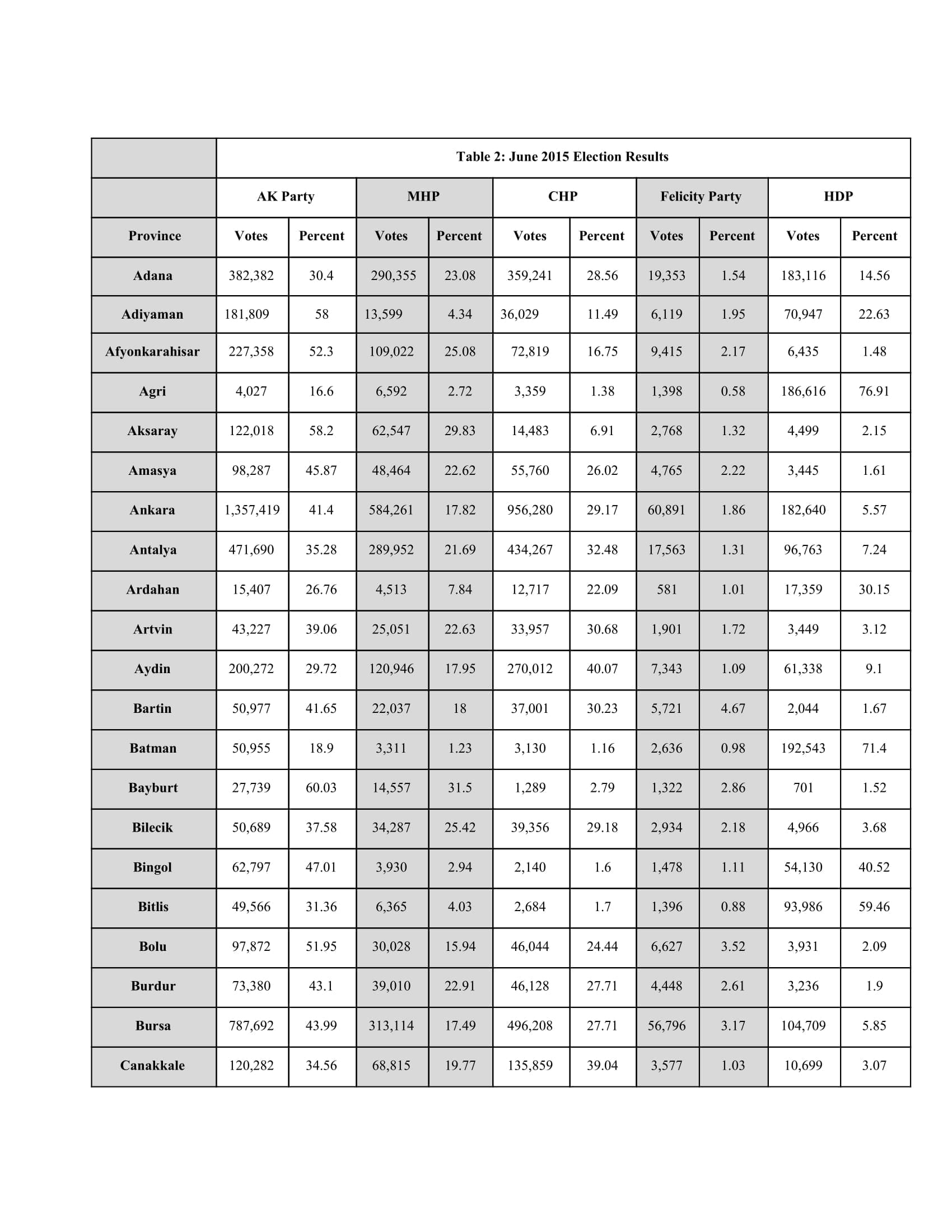

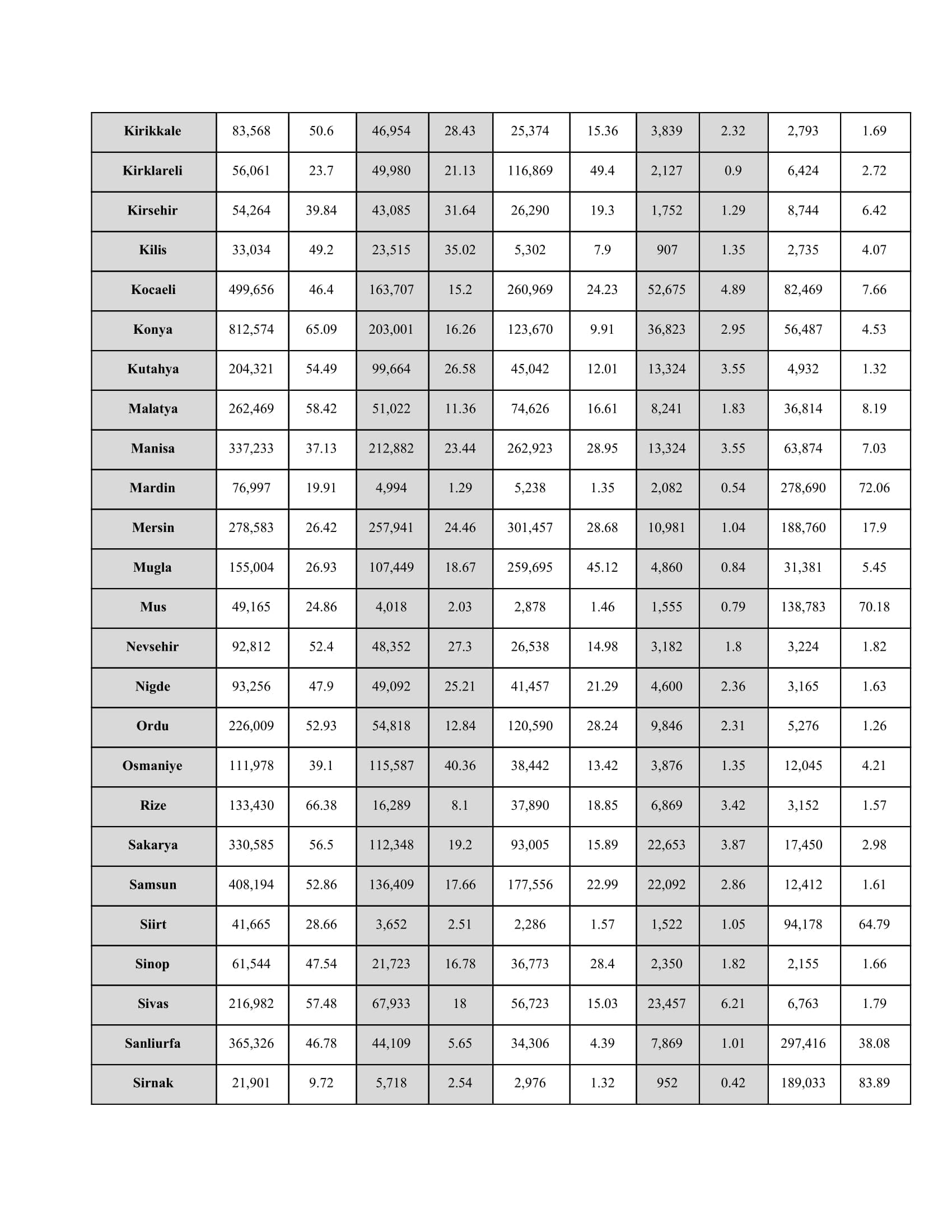

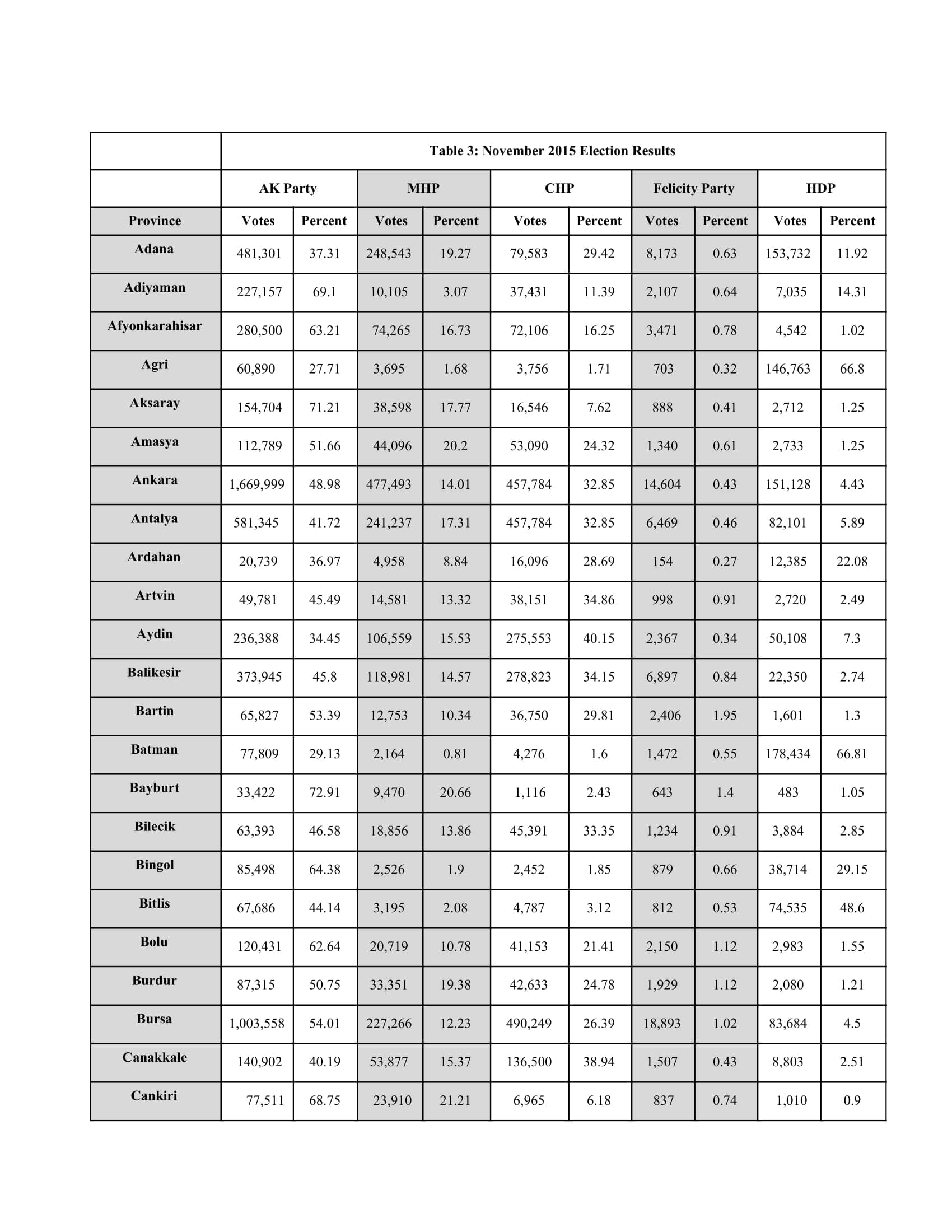
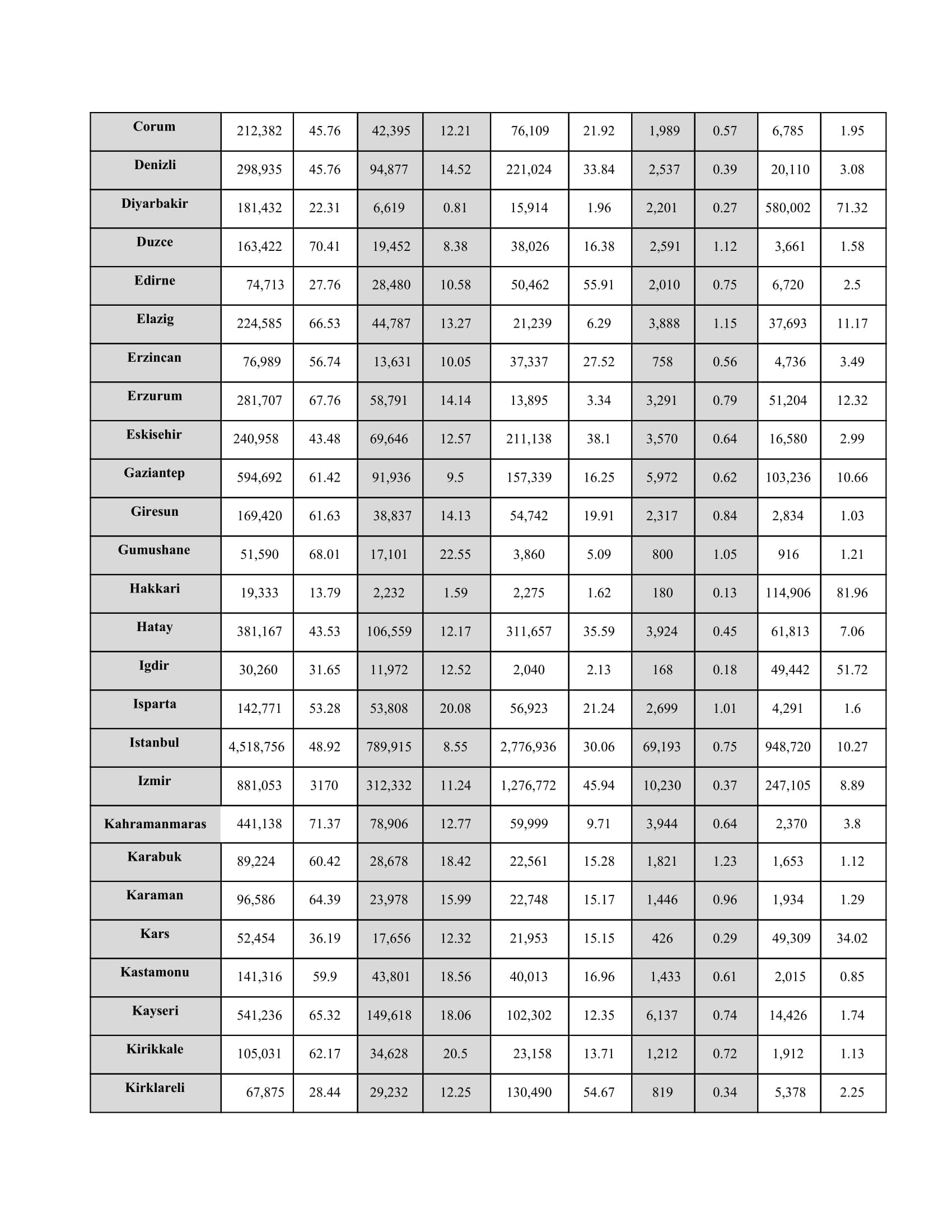


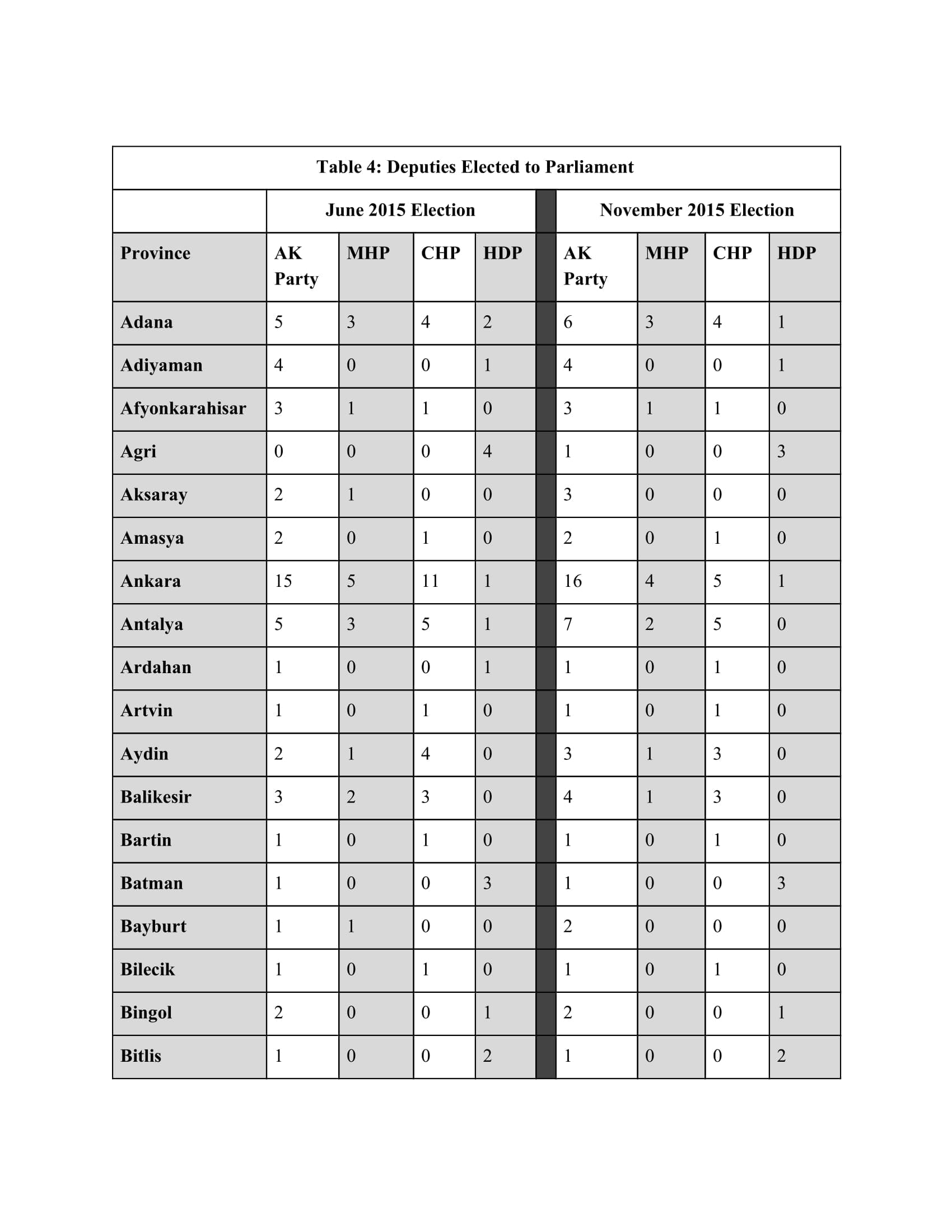

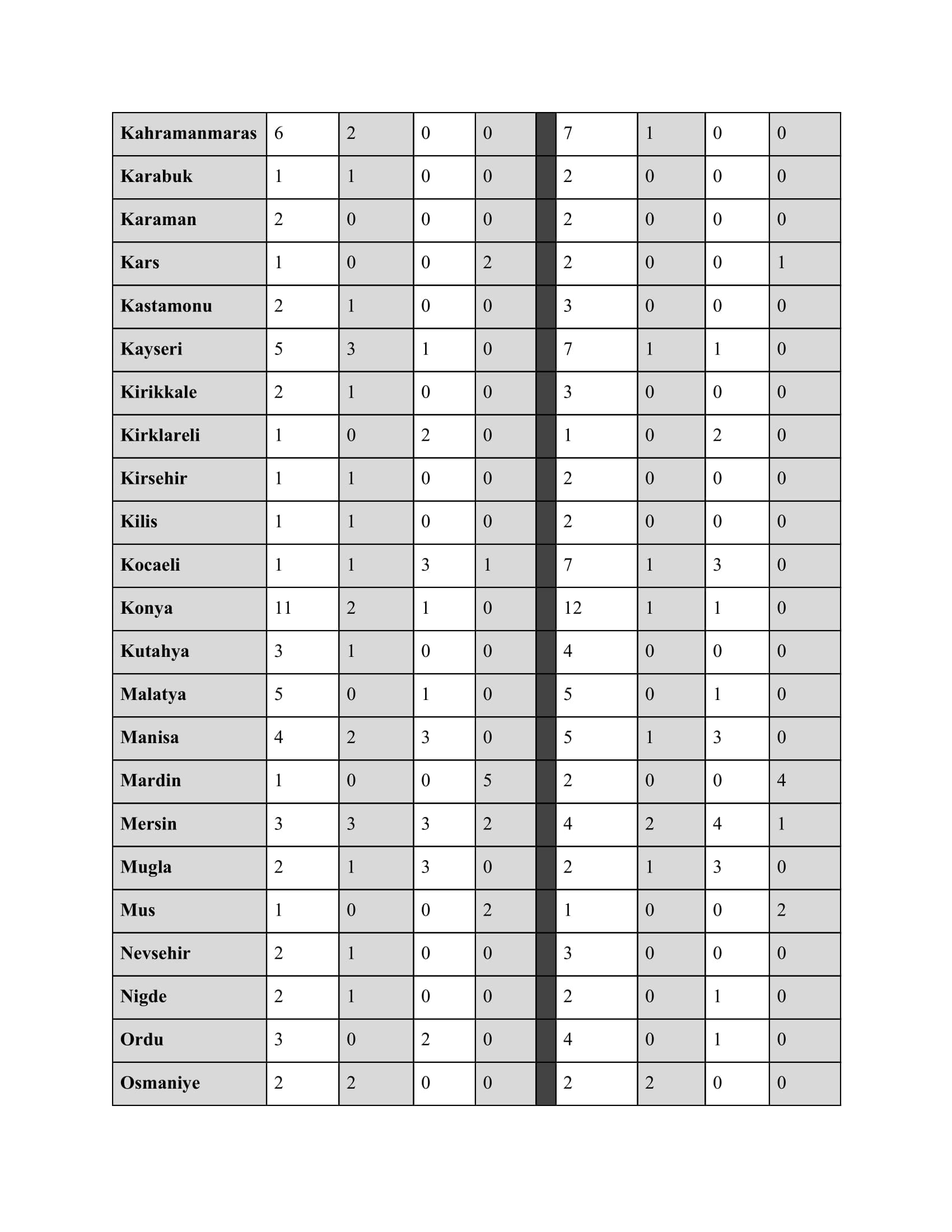

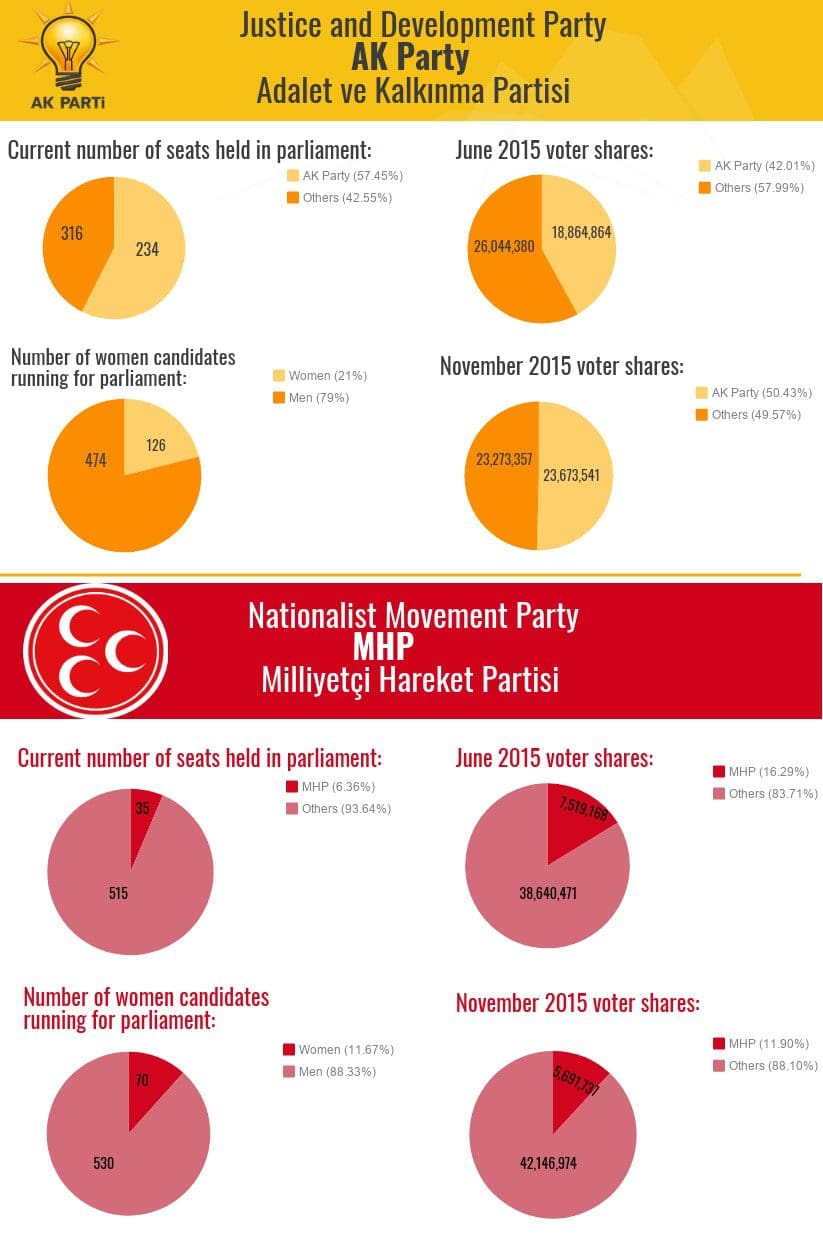
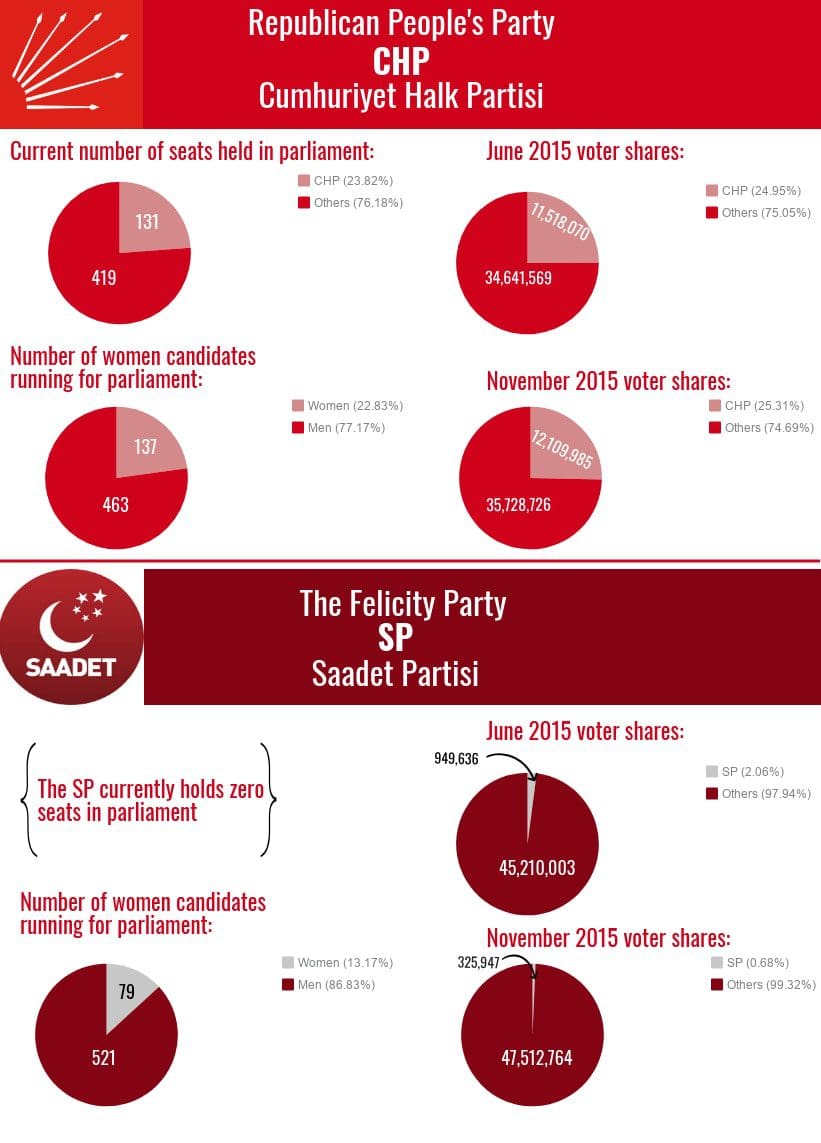
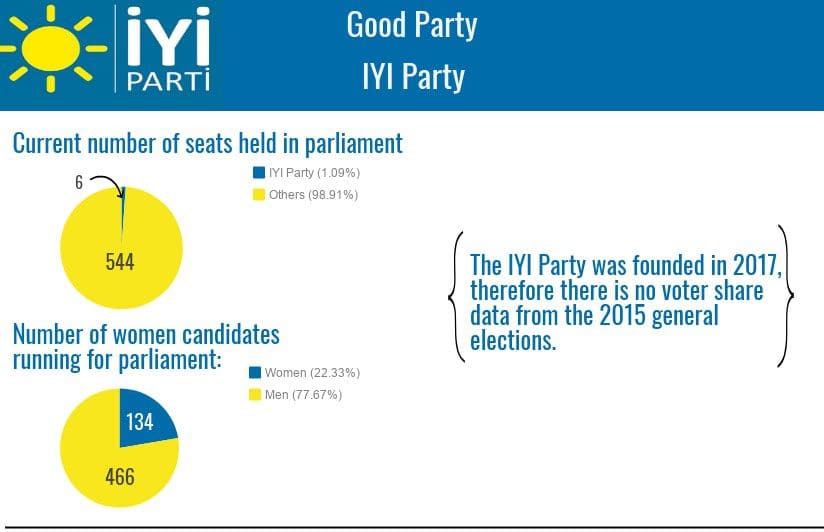
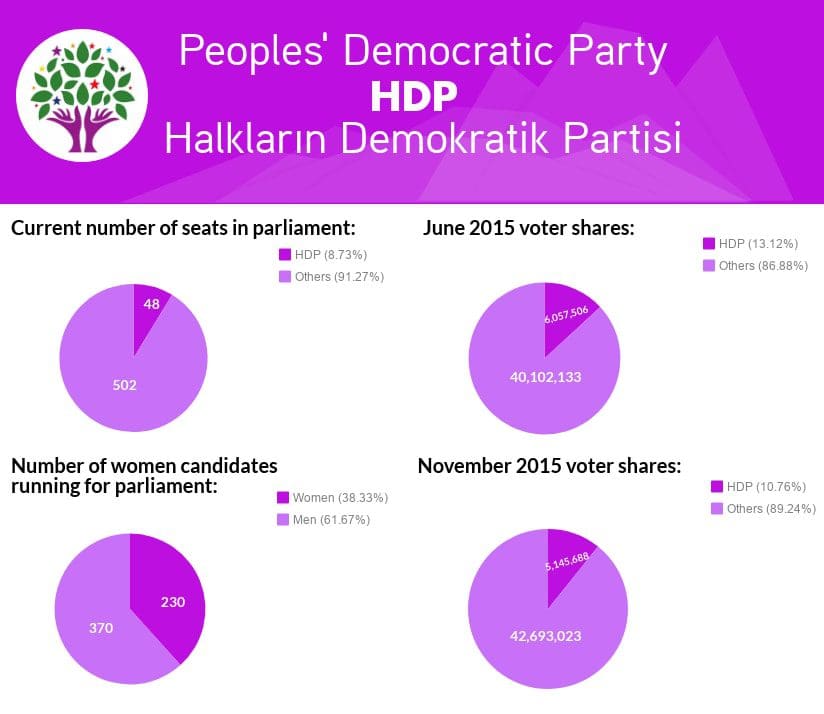 *See PDF for references
*See PDF for references
Labels »
Subscribe to SETA Spot on Weekly Bulletin



























